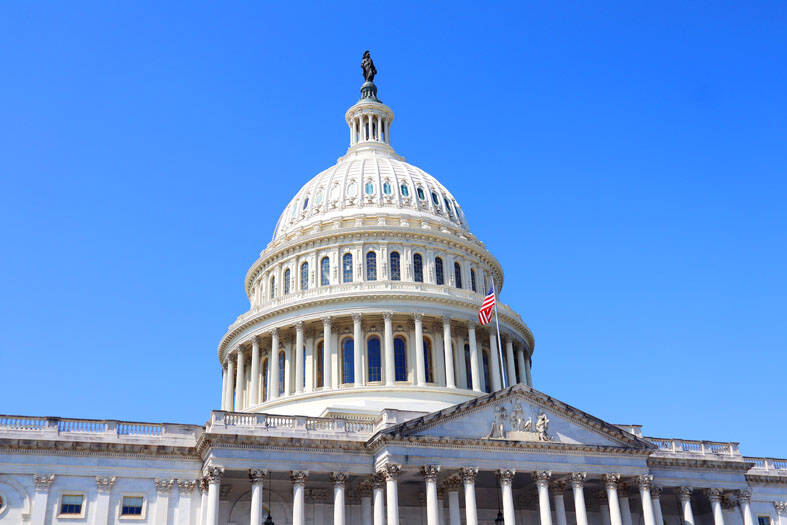US senators on Friday last week proposed a bill — the US-Taiwan partnership in the Americas act — supporting Taiwan’s diplomatic allies in Latin America and the Caribbean to counter China’s pressure on them to sever ties with Taiwan.
The bill was introduced by US senators Jeff Merkley and Tim Kaine of the Democratic Party and US senators John Curtis and Pete Ricketts of the Republican Party.
“To support countries in Latin America and the Caribbean that maintain official diplomatic relations with Taiwan, to counter efforts by the People’s Republic of China to coerce or pressure governments into breaking such ties,” the bill’s text explicitly states as its main purpose.

Photo: CNA
The bill also aims to “deepen coordination with Taiwan on diplomatic, development, and economic engagement in the Western Hemisphere,” it states.
The bill was introduced as Taiwan faces increasing military and diplomatic aggression from China, which pressures Taiwan’s allies in the region to cut diplomatic ties, the senators said in a statement.
Taiwan has seven remaining allies in the region — Belize, Guatemala, Haiti, Paraguay, Saint Kitts and Nevis, Saint Lucia, and Saint Vincent and the Grenadines.
The bill says China has pressured them to “sever diplomatic relations with Taiwan by leveraging opaque development deals and backroom pressure.”
The act would also require the US secretary of state to establish a mechanism to monitor and respond to China-backed infrastructure and development projects in those nations, the bill says.
The mechanism should identify projects that carry strategic risks or involve nontransparent financing, coordinate appropriate US diplomatic or technical responsess, and share relevant information with the US Congress and with US allies, it adds.
The bill states that the US secretary of state would be required to submit semiannual status reports to the US Congress regarding Latin American governments that have taken steps to discontinue diplomatic relations with Taiwan, and also submit a detailed plan to support the maintenance of relations with Taiwan no later than 30 days after the secretary of state determines a country is planning to.
“China’s campaign to bully countries into abandoning Taiwan is part of its broader effort to reshape the global order through coercion and backroom deals,” the statement quoted Merkley as saying.
“This bipartisan bill pushes back by supporting governments that choose to maintain ties with Taiwan and makes clear that every nation should be free to choose its partners without fear of retribution from Beijing,” he said.
It cited Curtis as saying that the bill ensures the US is not only tracking China’s coercive tactics, but “actively responding with transparency, accountability, and strategic coordination.”
“It sends a clear message: We stand with our allies, and we will not allow authoritarian pressure to dictate the choices of sovereign nations,” he said.

The Taiwanese passport ranked 33rd in a global listing of passports by convenience this month, rising three places from last month’s ranking, but matching its position in January last year. The Henley Passport Index, an international ranking of passports by the number of designations its holder can travel to without a visa, showed that the Taiwan passport enables holders to travel to 139 countries and territories without a visa. Singapore’s passport was ranked the most powerful with visa-free access to 192 destinations out of 227, according to the index published on Tuesday by UK-based migration investment consultancy firm Henley and Partners. Japan’s and

NATIONAL SECURITY THREAT: An official said that Guan Guan’s comments had gone beyond the threshold of free speech, as she advocated for the destruction of the ROC China-born media influencer Guan Guan’s (關關) residency permit has been revoked for repeatedly posting pro-China content that threatens national security, the National Immigration Agency said yesterday. Guan Guan has said many controversial things in her videos posted to Douyin (抖音), including “the red flag will soon be painted all over Taiwan” and “Taiwan is an inseparable part of China,” while expressing hope for expedited “reunification.” The agency received multiple reports alleging that Guan Guan had advocated for armed reunification last year. After investigating, the agency last month issued a notice requiring her to appear and account for her actions. Guan Guan appeared as required,

Japan and the Philippines yesterday signed a defense pact that would allow the tax-free provision of ammunition, fuel, food and other necessities when their forces stage joint training to boost deterrence against China’s growing aggression in the region and to bolster their preparation for natural disasters. Japan has faced increasing political, trade and security tensions with China, which was angered by Japanese Prime Minister Sanae Takaichi’s remark that a Chinese attack on Taiwan would be a survival-threatening situation for Japan, triggering a military response. Japan and the Philippines have also had separate territorial conflicts with Beijing in the East and South China

A strong cold air mass is expected to arrive tonight, bringing a change in weather and a drop in temperature, the Central Weather Administration (CWA) said. The coldest time would be early on Thursday morning, with temperatures in some areas dipping as low as 8°C, it said. Daytime highs yesterday were 22°C to 24°C in northern and eastern Taiwan, and about 25°C to 28°C in the central and southern regions, it said. However, nighttime lows would dip to about 15°C to 16°C in central and northern Taiwan as well as the northeast, and 17°C to 19°C elsewhere, it said. Tropical Storm Nokaen, currently